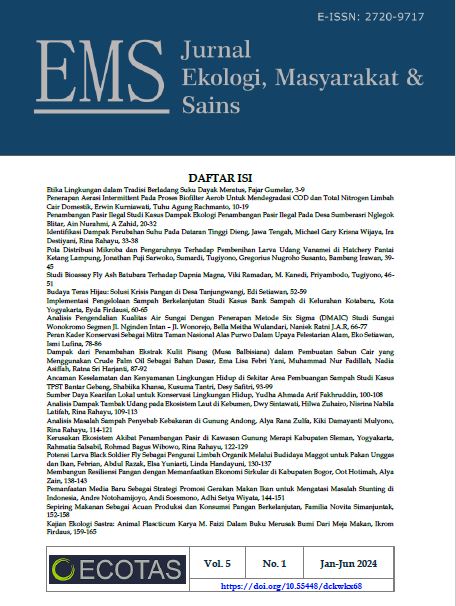Building Food Resilience by Utilizing Circular Economy in Bogor Regency
DOI:
https://doi.org/10.55448/r806zk70Abstract
Food is one of human primary need and in accordance to the twelfth poin of Sustainable Development Goals, there need to be a collaboration between the government body, communities, civil society, private sectors, and researchers. In addition to ending starvation, food production needs to be done with sustainability in mind, which not only focusing on increasing harvests, but also pay attention to environmental aspect generated in food production or/and consumption. The need of food is increasing along with the increasing of population in various cities, there’s a need for systematic transformation by applying the concept of circular economy, therefore to ensure the continuity of the use of the agricultural sector to meet basic needs, as a form of adaptation, namely by reusing product waste into more useful resources in the food production process in the next cycle.
References
AGRODITE. (2020). Circular Economy in the Indonesian Agricultural Sector Caw Studies from the Field for a Circular Vision.
Amanda, D., & Firdaus, N. S. A. (2023). Defisit Beras Masuh Cukup Tinggi. Republika.
Badan Pangan Nasional. (2022). Indeks Ketahanan Pangan.
Badan Perencanaan Pembangunan Nasional. (2023). Penduduk Berkualitas Menuju Indonesia Emas Kebijakan Kependudukan Indonesia 2020-2050.
Badan Pusat Statistik. (2023). Kabupaten Bogor Dalam Angka 2023.
Chan, S., Weitz, N., Persson, Å., & Trimmer, C. (2018). Stockholm Environment Institute SDG 12: Responsible Consumption and Production-A Review of Research Needs 1 1 SDG 12: Responsible Consumption and Production A review of research needs Annex to the Formas report Forskning för Agenda 2030: Översikt av forskningsbehov och vägar framåt.
Economist Impact. (2022). Country report: Indonesia. https://impact.economist.com/sustainability/project/food-security-index/reports/Economist_Impact_GFSI_2022_Indonesia_country_report_Sep_2022.pdf
Food and Agriculture Organization. (2021). Emissions due to agriculture Global, regional and country trends 2000-2018.
Geissdoerfer, M., Savaget, P., Bocken, N. M. P., & Hultink, E. J. (2017). The Circular Economy – A new sustainability paradigm? Journal of Cleaner Production, 143, 757–768. https://doi.org/10.1016/j.jclepro.2016.12.048
Hamdir, A. A. W., & Nurhasanah, Y. (2021). Inisiasi Lokal Model Ekonomi Sirkular Melalui Pertanian Terpadu Sebagai Adaptasi Petani di Kalimantan Timur Selama Pandemi Covid-19. Learning Society: Jurnal CSR, Pendidikan Dan Pemberdayaan Masyarakat, 2(1), 88–100.
Herdiansyah, H., Antriyandarti, E., Rosyada, A., Arista, N. I. D., Soesilo, T. E. B., & Ernawati, N. (2023). Evaluation of Conventional and Mechanization Methods towards Precision Agriculture in Indonesia. Sustainability (Switzerland), 15(12). https://doi.org/10.3390/su15129592
Lame, G. (2019). Systematic literature reviews: An introduction. Proceedings of the International Conference on Engineering Design, ICED, 2019-August, 1633–1642. https://doi.org/10.1017/dsi.2019.169
Lynch, J., Cain, M., Frame, D., & Pierrehumbert, R. (2021). Agriculture’s Contribution to Climate Change and Role in Mitigation Is Distinct from Predominantly Fossil CO2-Emitting Sectors. Frontiers in Sustainable Food Systems, 4. https://doi.org/10.3389/fsufs.2020.518039
Malthus, T. R. (1997). An Essay on the Principle of Population. Elecbook London.
Mulia, A. (2022). Timbulan dan Komposisi Sampah Perumahan Kabupaten Bogor yang Masuk ke TPA Galuga.
Nattassha, R., Handayati, Y., Simatupang, T. M., & Siallagan, M. (2020). Understanding circular economy implementation in the agri-food supply chain: the case of an Indonesian organic fertiliser producer. Agriculture and Food Security, 9(1). https://doi.org/10.1186/s40066-020-00264-8
Pasaribu, S. M. (2006). Factors Affecting Circular Economy Promotion in Indonesia: The Revival of Agribusiness Partnership Factors Affecting Circular Economy Promotion in Indonesia: The Revival of Agribusiness Partnership. Forum Penelitian Agro Ekonomi, 24(2), 135–144.
Ronalia, P. (2021). Dampak Resiliensi Terhadap Kerawanan Pangan Rumah Tangga di Indonesia. Universitas Indonesia.
Selvan, T., Panmei, L., Murasing, K. K., Guleria, V., Ramesh, K. R., Bhardwaj, D. R., Thakur, C. L., Kumar, D., Sharma, P., Digvijaysinh Umedsinh, R., Kayalvizhi, D., & Deshmukh, H. K. (2023). Circular economy in agriculture: unleashing the potential of integrated organic farming for food security and sustainable development. In Frontiers in Sustainable Food Systems (Vol. 7). Frontiers Media SA. https://doi.org/10.3389/fsufs.2023.1170380
Velasco-Muñoz, J. F., Mendoza, J. M. F., Aznar-Sánchez, J. A., & Gallego-Schmid, A. (2021). Circular economy implementation in the agricultural sector: Definition, strategies and indicators. Resources, Conservation and Recycling, 170. https://doi.org/10.1016/j.resconrec.2021.105618
Yusriana, Jaya, R., & Sembiring, M. T. (2023). Ekonomi Sirkular Pada Manajemen Rantai Pasok Agroindustri: Konseptual Dan Rancangan Implementasi. Jurnal Teknologi Industri Pertanian, 196–205. https://doi.org/10.24961/j.tek.ind.pert.2023.33.2.196
Downloads
Published
Issue
Section
License
Copyright (c) 2024 Jurnal Ekologi, Masyarakat dan Sains

This work is licensed under a Creative Commons Attribution-NonCommercial 4.0 International License.
Authors of articles published in Jurnal EMS are permitted to self-archive the published/PDF version anywhere.





























